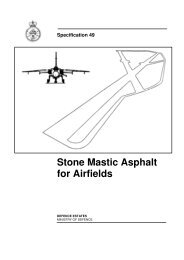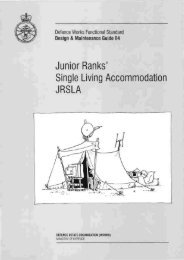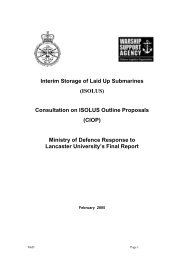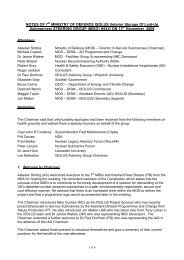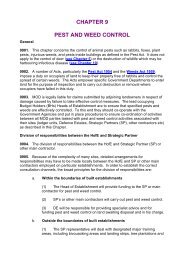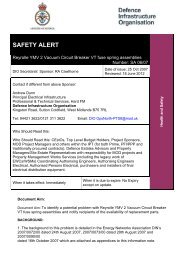Hot Rolled Asphalt and Asphalt Concrete (Macadam) - Ministry of ...
Hot Rolled Asphalt and Asphalt Concrete (Macadam) - Ministry of ...
Hot Rolled Asphalt and Asphalt Concrete (Macadam) - Ministry of ...
You also want an ePaper? Increase the reach of your titles
YUMPU automatically turns print PDFs into web optimized ePapers that Google loves.
Specification 12 <strong>Hot</strong> <strong>Rolled</strong> <strong>Asphalt</strong> <strong>and</strong> <strong>Macadam</strong> Appendix Y - Guidance Notes on Quality Systems<br />
for Airfields for Project Managers<br />
Appendix Y – Guidance Notes on Quality Systems for Project<br />
Managers<br />
Y.1 INTRODUCTION<br />
These Guidance Notes are intended to assist<br />
Project Managers in assessing Suppliers’ Quality<br />
Assurance (QA) systems for the supply <strong>of</strong><br />
component <strong>and</strong> mixed materials as required by<br />
Clause 2.4. In particular, guidance is given on:<br />
• how to appraise <strong>and</strong> evaluate different Quality<br />
Systems <strong>of</strong>fered by Suppliers when tendering for<br />
jobs (Clauses Y.5 <strong>and</strong> Y.6); <strong>and</strong><br />
• how to monitor work undertaken (Clause Y.7).<br />
Separate clauses are devoted to each aspect.<br />
Y.2 GENERAL<br />
Y.2.1 These Guidance Notes are not intended to<br />
replace the BS EN ISO 9000 series <strong>and</strong> associated<br />
documentation.<br />
Y.2.2 The generic term “Client” or “Purchaser” in<br />
these Guidance Notes is to include the person or<br />
organisation that is acting for, or on behalf <strong>of</strong>, the<br />
Property Manager or the Project Sponsor in the role<br />
<strong>of</strong> either a Project Manager.<br />
Y.2.3 The generic term “Supplier” is used to cover<br />
any person or organisation that has, or is tendering<br />
for, a Contract with the Client to supply a product or<br />
service, <strong>and</strong> includes those traditionally referred to<br />
as the (main) Contractor.<br />
Y.2.4 Products which are specified by means <strong>of</strong> a<br />
Harmonised European St<strong>and</strong>ard under the<br />
Construction Products Directive are subject to CE<br />
marking. It is not permitted to require additional<br />
quality assurance or testing requirements over <strong>and</strong><br />
above those required for Attestation <strong>of</strong> Conformity<br />
within the European St<strong>and</strong>ard. The CE mark<br />
certificate should be taken as sufficient evidence <strong>of</strong><br />
product conformity.<br />
Y.3 QUALITY SYSTEMS<br />
Y.3.1 It is now the accepted practice that all<br />
suppliers <strong>of</strong> goods <strong>and</strong> services should:<br />
• install <strong>and</strong> maintain a Quality Management<br />
System; <strong>and</strong><br />
• become registered to a United Kingdom<br />
Accreditation Service (UKAS) accredited third<br />
party certification scheme as a Supplier <strong>of</strong><br />
assessed capability.<br />
Y.3.2 It is general practice that, once a Quality<br />
Management Scheme has been set up within an<br />
organisation, application for registration to a second<br />
or third party certification scheme will be made.<br />
Y.3.3 Second party assessment is carried out by<br />
the purchasing organisation; this is very expensive<br />
because the resource requirements for systematic<br />
<strong>and</strong> continuous auditing <strong>and</strong> the management <strong>of</strong> an<br />
assessment scheme are extremely high.<br />
Consequently, this form <strong>of</strong> registration is now in<br />
decline <strong>and</strong> organisations which previously carried<br />
out second party assessment, such as British<br />
Telecom, British Gas, what used to be the National<br />
Coal Board <strong>and</strong> the MoD, are beginning to insist<br />
that their suppliers obtain third party assessment<br />
<strong>and</strong>, hence, pay the costs <strong>of</strong> quality assurance.<br />
Y.3.4 Certification <strong>of</strong> a Supplier’s Quality<br />
Management System by a third party should<br />
provide the Purchaser with the confidence that the<br />
Supplier is:<br />
• operating <strong>and</strong> maintaining a fully documented<br />
Quality Management System that addresses<br />
consistent requirements; <strong>and</strong><br />
• operating within the scope <strong>of</strong> registration.<br />
This avoids the need for the Purchaser to undertake<br />
his own structured regime <strong>of</strong> second party<br />
assessments to ascertain the adequacy <strong>and</strong> focus<br />
<strong>of</strong> the Supplier’s Quality Management Systems.<br />
Y.3.5 However, this does not absolve the Project<br />
Manager <strong>of</strong> his responsibilities on behalf <strong>of</strong> the<br />
Client to ensure that the Quality System <strong>of</strong> the<br />
Supplier addresses all the requirements <strong>and</strong> needs.<br />
This is because the Quality St<strong>and</strong>ards are<br />
interpreted differently by individual organisations.<br />
Y.3.6 In principal, the more independent the<br />
assessment <strong>and</strong> audit regime, the more confident<br />
the Purchaser can be as to the value <strong>of</strong> a Supplier’s<br />
46 July 2010



